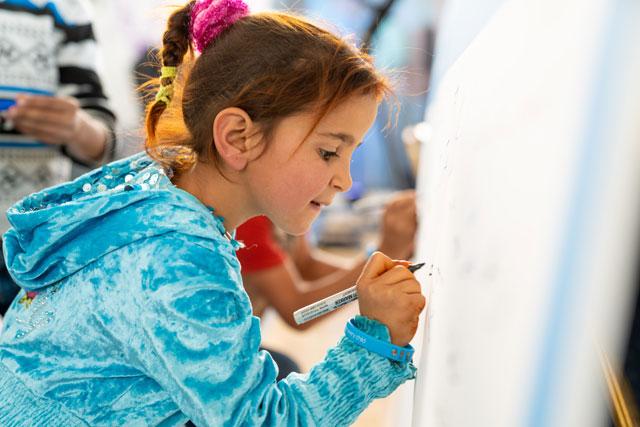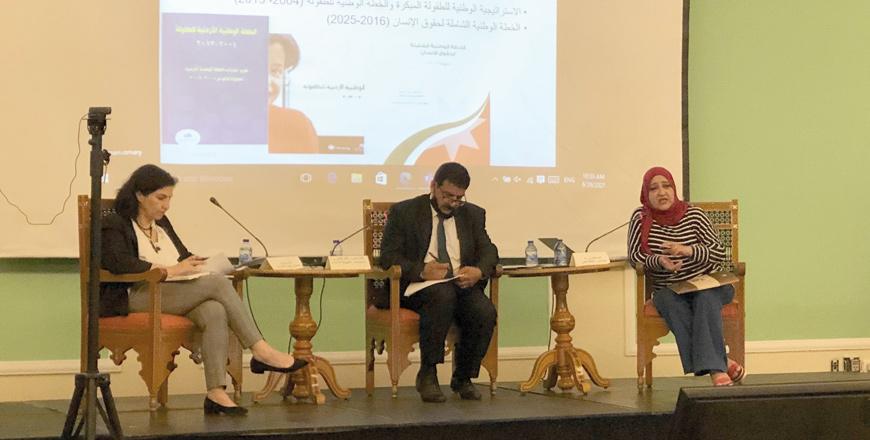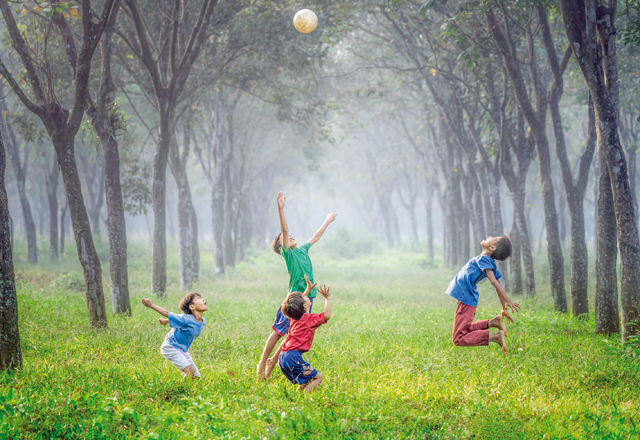You are here
Jordan calls for strong commitment to children’s safety on World Children’s Day
By Ana V. Ibáñez Prieto - Nov 19,2018 - Last updated at Nov 19,2018

A young girl signs a global pledge calling on world leaders to commit to the rights of every child in Amman on Monday (Photo courtesy of UNICEF Jordan)
AMMAN — Over 100 Jordanian children on Monday raised their voices and signed a global pledge calling on world leaders to commit to the rights of every child and demanding for “all children to remain in school, safe from harm and able to achieve their potential”.
The move came as part of the World Children’s Day (WCD) celebrations held by UNICEF and the National Council for Family Affairs (NCFA), which gathered teachers and students aiming to raise awareness on the importance of ending violence against children in Jordan.
Celebrated worldwide every November 20, WCD aims at raising awareness and funds for the millions of youth who remain unschooled, unprotected and uprooted, according to UNICEF sources.
Held under the patronage of Prime Minister Omar Razzaz, the event also served as a platform to celebrate author Joud Mbaideen and singer Emanne Beasha as UNICEF Jordan’s first Champions for Children.
UNICEF Champions for Children is “a community of individuals whose regular contributions enable the most vulnerable children worldwide to enjoy the right to education, healthcare and nutrition, and protection from violence, abuse and exploitation,” according to UNICEF’s website.
Thanking the new “champions” for their efforts, UNICEF Jordan Representative Robert Jenkins said that “their voices will be vitally important as we strive to improve the lives of all children — especially the most vulnerable in this community”, assuring that “UNICEF will continue to work with the Jordanian government and all partners so that every child can reach their full potential”.
NCFA Secretary General Mohammad Meqdadi noted that the council’s objective is to “protect children from violence, develop early childhood programmes and create an environment where children have access to quality education, health services and playgrounds”, adding that the organisation also focuses on legal education on the rights of children, and in providing sustainable awareness programmes for the early detection of violence.
The official highlighted the national efforts undertaken in this regard, citing the cooperation with UNICEF to launch a child friendly booklet that explains children’s rights in a simple language.
The UN agency also launched a global call for supporters to express their solidarity with the most disadvantaged and vulnerable children by “making or wearing something blue at school, on the streets, on social media, in boardrooms and on sports fields” on November 20.
The Treasury in Petra, as well as Le Royal Hotel in Amman, lit up blue on WCD to demand that world leaders put children at the top of the agenda.
The Jordan Labour Watch (JLW) also took the chance to examine the issue of child labour, calling on decision makers to “introduce policies that translate into real change on the ground”.
In a position paper issued on the occasion, the organisation warned that “working children in Jordan are subjected to ill treatment, psychological and physical abuse — and in many cases, sexual assault”, adding that “exploitation in the workplace often leaves irreparable psychological and physical wounds”.
“Despite the efforts exerted by Jordanian institutions and international organisations, the number of children involved in the Jordanian labour market continues to increase,” the paper warned, noting that the most recent survey carried out by the International Labour Organisation in cooperation with the Ministry of Labour and the Centre for Strategic Studies indicated that the number of working children in Jordan stands at approximately 76,000, with some 45,000 of them suffering from hazardous work conditions.
According to the paper, the number of child labour victims doubled when compared to the statistics issued in 2006, when the figure stood at some 33,000 children.
“The national legislation in the field of child labour is highly compatible with the standards set out in the relevant international conventions, but despite the clear provisions in the legal framework, the indicators prove that more actions need to be taken to change the reality,” the organisation said.
JLW attributed the ever-increasing rates of child labour in the Kingdom to “the social and economic reality of the country and the poor social justice indicators”, explaining that “this situation has led to a decline in the living standards of a large number of Jordanian families, which has forced them to take their children out of school and send them into the labour market in order to contribute to the household income”.
“There is an urgent need to revisit the economic policies that have been applied in Jordan over the last decades,” it recommended.
Related Articles
AMMAN — The Jordan Labour Watch (JLW) has warned of an increase in child labour rates due to a rise in poverty, unemployment rates and remot
DEAD SEA — The National Council for Family Affairs (NCFA) kicked off a two-day workshop on Saturday in collaboration with UNICEF to mobilise
AMMAN — Jordan on Sunday will mark World Children’s Day due to the importance of promoting and implementing children’s rights to advance chi
















